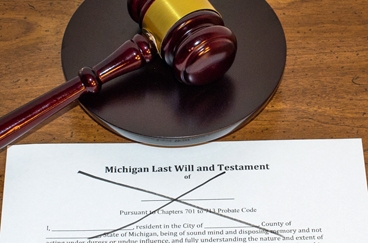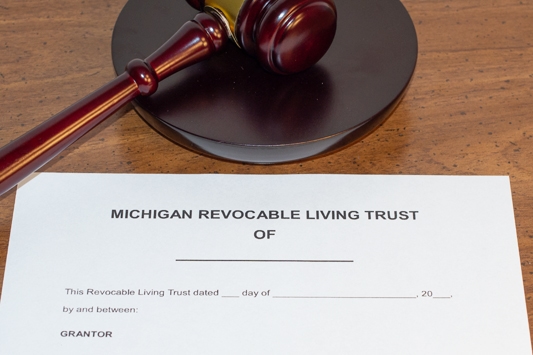When someone passes away in Michigan, there’s a specific process used to determine who receives assets and inheritance of the deceased individual. This process is handled through a specialized court system called probate court.
A probate lawyer specializes in understanding this process and handling any legal issues that may arise including:
If you or a loved one need help with probate in Michigan, contact our offices today.
Probate court is a specialized court that deals with legal issues surrounding aging, illness, and inheritance. For example, when someone dies without a will, or there’s legal issues with the distribution of assets/inheritance, an attorney is required to represent each party.
When done correctly it takes between nine and twelve months. Smaller estates can probate a lot faster.
When someone passes away they become known as a decedent; and their property is considered intestate. After this occurs someone, usually a friend or family member, files a petition with the probate court to have the decedents’ estate opened.
The petitioner is asking that a personal representative be put in charge of the decedent’s probate estate. The court will then go through the process to have a personal representative appointed.
As a personal representative there are a lot of duties to handle including:
When someone passes away, their property and assets are typically divided among relatives of the deceased. Unfortunately, even when the decedent has an estate plan in place, disputes may arise. According to the State Bar of Michigan,
“Using a lawyer experienced in probate and estate administration will make the entire process efficient and cost-effective, even when no formal proceedings are required. A lawyer will help you avoid mistakes in administration and make sure you are not held personally liable for the decedent’s debts. Also, the legal fees are paid from the estate. Using a lawyer is especially important if it is unclear who should receive the decedent’s assets or if there is conflict among the heirs or beneficiaries.” (State Bar of Michigan, 2020, Probate Information Probate & Estate Administration)
A probate attorney can take you through the whole probate of an estate or part of the process, through a limited retainer. Probate has many forms that need to be addressed and each form has thousands of pages of cases and statutes behind it. Probate forms are created by the courts to make it easier to manage cases.
These forms do not cover the complicated parts of probate. Probate has numerous deadlines and requirements that are not apparent from the forms and a personal representative can be personally liable if something goes wrong. Small mistakes can have big consequences and so it makes sense that a personal representative has an attorney. Additionally, probate court is required for legal issues with guardianships, wills, trusts, etc.
Whether your issue involves standard administration of an estate based on a will or trust, or there’s more complicated legal matters such as estate litigation, our law firm is well-equipped to meet your legal needs.
Sean J Nichols, PLLC handles a wide variety of estate and probate matters. Learn more about these individual areas within the links below.

Probate Administration
Simply put, probate administration involves administering assets or inheritance to family members or other beneficiaries after an individual passes away. An attorneys assistance in this process is vital. For example, an attorney understands how to properly determine which assets are actually part of the estate and required to go through this process.

Trust Administration
The administration of a trust is overseen in probate court to ensure proper asset distribution to the correct beneficiaries in accordance with the terms written within this document. The law firm of Sean J Nichols, PLLC is experienced in trust administration and can help oversee this process to avoid any issues throughout this administration.

Probate Litigation
Another aspect of probate court involves litigation. In short, probate litigation involves a formal dispute over inheritance or an estate. This may include challenging a will, challenging a trust, or other disputes regarding the administration of an estate.

Probate Without a Will
When someone dies without a will, their property is considered “intestate.” This means. The court will have to invoke a specific process in determining who receives the property and assets of the deceased.

Trust Disputes
Trusts can be challenged on several grounds. For example, a trust may be disputed on the grounds of undue influence over the settlor, unclear, language in the trust document, breach of fiduciary duty by the trustee, failure to make proper or timely distributions, etc.

Challenges to Wills
Wills can be challenged on several grounds including validity, authenticity, or diminished mental capacity. That is, if someone believes a will was improperly signed, executed, changed, or that other foul play occurred, the document can be formally challenged in probate court.

Probating a Will
When someone passes away, a will is the first piece of evidence used by the court in deciding who receives ownership for property of the deceased. An attorney can help oversee this process to ensure this property is correctly distributed in a timely manner in accordance with the final wishes of the deceased.

Guardianship
Simply put, when someone is appointed as a legal guardian over another individual, this means they are in charge of making decisions on their behalf. Guardianship is not always straightforward. guardianship over minors or individuals with special needs involving government benefits have specific legal requirements. These hearings are done through probate court.

Conservatorship
Similar to guardianship, conservatorship involves appointing a responsible individual to care for another person. Conservatorships are most commonly appointed in cases where someone is mentally ill, suicidal, incapacitated, and other urgent circumstances. Once again, this process is administered through the probate court system.

Probate courts are in charge of guardianships and conservatorships as well. When a loved one, friend or neighbor is suffering from dementia, Alzheimer’s disease or mental illness there is always a concern that they will be a threat to themselves or those around them. These individuals are vulnerable and easily exploited. To avoid this from happening guardianship and conservatorships are put in place through the court.
Guardianship and conservatorship are the most powerful way to protect a loved one susceptible to this kind of danger. Guardianship and conservatorship proceedings are meant to have you or someone else placed in charge of your loved one, to protect them. Having an experienced and specialized probate lawyer dramatically increases your chances of success. When people try to do guardianships or conservatorships without a lawyer they have considerable difficulty and can easily fail.
A guardian guards an individual and makes living, medical and other important decisions for a person who needs them. A conservator conserves the financial assets of the person needing conservatorship and makes all of the financial decisions.
Usually one person serves both responsibilities as the guardian and conservator though the court has been known to assign separate people to fill these important roles. There are many factors that weigh a judge will weigh before granting guardianship over your loved one including:
The decision to remove someone’s right to make their own decisions is not a procedure that is taken lightly in court. To infer a person has become unfit to think for themselves is a major part of the court proceedings. This is followed by an equally critical decision to select the right person to serve as their guardian.
The law firm of Sean J Nichols, PLLC is located in Plymouth, Michigan. We are experienced in handling probate cases all across Michigan. This includes working with clients that are located outside of the state.
Sean J Nichols, PLLC has years of experience helping individuals and families navigate the complex processes involved in Michigan probate court. Regardless of the complexity of your case, our firm can help avoid a hassle for you and your family.
If you have legal issues involving probate in Michigan, call our offices today. (734) 386-0224